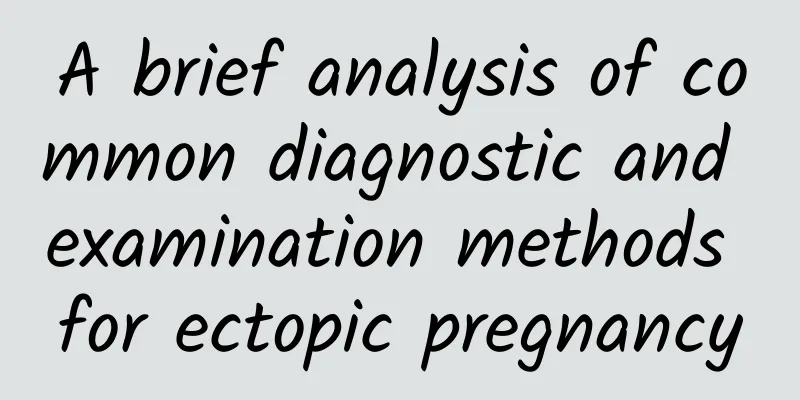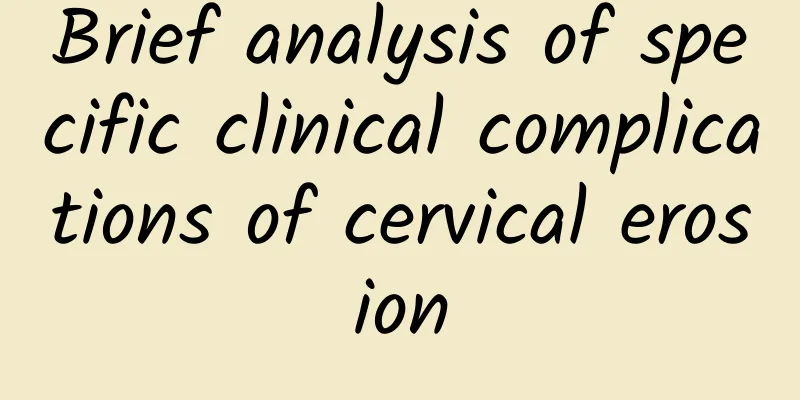A brief analysis of common diagnostic and examination methods for ectopic pregnancy

|
Ectopic pregnancy is a gynecological disease that seriously endangers women's health. Early detection of ectopic pregnancy is the key to treating ectopic pregnancy . What are the diagnostic examination methods for ectopic pregnancy? The following will tell you about the common diagnostic examination methods for ectopic pregnancy. In general, the common diagnostic tests for ectopic pregnancy are: 1. HCG determination. It is an important method for early diagnosis of ectopic pregnancy. 2. Progesterone measurement. The serum P level of ectopic pregnancy is low, but it is relatively stable at 5 to 10 weeks of pregnancy. A single measurement has a great diagnostic value. Although there is overlap between normal and abnormal pregnancy serum P levels, it is difficult to determine the absolute critical value between them, but serum P levels lower than 10ng/m1 (radioimmunoassay) often indicate abnormal pregnancy, and its accuracy rate is about 90%. 3. Ultrasound diagnosis. Type B ultrasound examination is particularly commonly used for the diagnosis of ectopic pregnancy, and vaginal B ultrasound examination is more accurate than abdominal B ultrasound examination. 4. Diagnostic curettage. When ectopic pregnancy cannot be ruled out, diagnostic curettage can be performed to obtain the endometrium for pathological examination. However, the endometrial changes in ectopic pregnancy are not characteristic and can be manifested as decidual tissue, highly secretory phase with or without A-S reaction, secretory phase and proliferative phase. Endometrial changes are related to whether the patient has vaginal bleeding and the duration of vaginal bleeding. Therefore, the diagnosis of ectopic pregnancy by diagnostic curettage alone has great limitations. 5. Posterior fornix puncture. Posterior fornix puncture is widely used to assist in the diagnosis of ectopic pregnancy. Blood can often be drawn out and placed without coagulation, and there are small clots in it. If no liquid is drawn out, the diagnosis of ectopic pregnancy cannot be ruled out. 6. Laparoscopic examination. In most cases, early ectopic pregnancy can be diagnosed after medical history, gynecological examination, blood β-HCG measurement, and B-ultrasound examination. However, for some cases that are difficult to diagnose, examination under direct laparoscope can confirm the diagnosis in time and can be treated surgically at the same time. The above is an introduction to the diagnostic examination methods for ectopic pregnancy. I hope it will be helpful to you. If you have any questions, you can contact our online experts, who will give you detailed answers. For more information, please visit the ectopic pregnancy disease special topic at http://www..com.cn/fuke/gwy/ or consult an expert for free. The expert will then give a detailed answer based on the patient's specific situation. |
<<: Experts answer questions about how to deal with dysmenorrhea
>>: Experts teach you how to correctly understand ectopic pregnancy
Recommend
Will cervical erosion lead to infertility? These common sense about cervical erosion suggest that women should know it early
Some patients with cervical erosion may be caused...
Understand the main classification of uterine fibroids
What are the main classifications of uterine fibr...
Motherwort soup can improve menstrual irregularities
When women have symptoms of irregular menstruatio...
Just can’t lose weight? All-round weight loss, look here
The main reason for weight gain is that the calor...
Current strategies for preventing cervical precancerous lesions
There are no obvious symptoms of cervical precanc...
What are the diagnostic methods for Trichomonas vaginitis?
Vaginitis is very common in life, and Trichomonas...
What are the causes of multiple uterine fibroids? Are multiple uterine fibroids benign tumors?
Women with childbearing experience are immune to ...
How should patients with cervical erosion eat properly? Women with cervical erosion should keep these dietary taboos in mind
In life, the high incidence of cervical erosion a...
Treatment of Dysmenorrhea by TCM Syndrome Differentiation
Dysmenorrhea seriously disrupts women's norma...
How to stay away from uterine fibroids?
How to prevent uterine fibroids? Many female frie...
Symptoms of atrophic and hyperplastic vulvar leukoplakia are different
The lesions of vulvar leukoplakia are mostly loca...
Let you learn more about the early symptoms of chronic pelvic inflammatory disease
Pelvic inflammatory disease is already a common d...
Do people who have early menopause look younger?
People who go through menopause early do not nece...
What does menopause mean?
Menopause is actually an important turning point ...
What causes uterine fibroid rupture?
Uterine fibroid rupture is generally caused by im...









